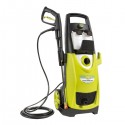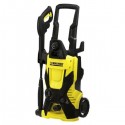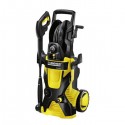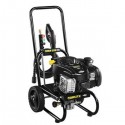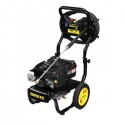Residential Pressure Washer Reviews
These are the 10 best residential pressure washers based on product quality, customer satisfaction, and price:
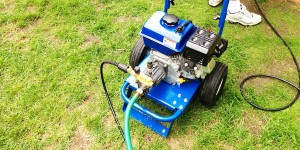 There are not really any options out there for having an all around cleaning tool in your garage or tool shed that are quite like a residential pressure washer. These powerful little machines have a very wide range of applications, and you will certainly find new uses for them beyond what you may have originally expected them to be useful for. Residential pressure washers can be used to wash your car, wash windows and walls, clean your driveway and sidewalks, decks, lawn furniture, tools lawn care machines, and more.
There are not really any options out there for having an all around cleaning tool in your garage or tool shed that are quite like a residential pressure washer. These powerful little machines have a very wide range of applications, and you will certainly find new uses for them beyond what you may have originally expected them to be useful for. Residential pressure washers can be used to wash your car, wash windows and walls, clean your driveway and sidewalks, decks, lawn furniture, tools lawn care machines, and more.
You can use a residential pressure washer to make discolored, aged looking wood on your deck look bright and brand new again, especially if its water sealer has worn off. If you have vinyl siding that is not on a wall that gets a lot of sun, you probably have experience with it getting moldy and grimy. A pressure washer – especially if used with a 10% bleach application – can get rid of all of the mold and have the siding looking snow white again. If you have a big lawn, you may find that your mower gets a lot of mulch built up on it after a few uses, and this can be hard to get off. But with a residential pressure washer it is a snap to blast grass clippings off of the cutting deck of your lawn mower.
If you grill outdoors a lot, a residential pressure washer can be a great tool to quickly and easily clean off the grill surface and keep the body of the grill looking bright and brand new. You can remove the grates and pressure wash them separately; in this instance, mixing a bit of degreaser into the detergent reservoir can help clean off the grates and body of the grill in a snap.
Second story windows can be a lot of trouble to wash by hand; you have to get up on an extension ladder for each one on its own. But with a pressure washer, you can blast them clean with just water every spring and fall to get seasonal grime and dirt off of them.
If you have double hung screens on your house, you know that they can get dusty and dirty, especially in the late summer and early fall, or if they have been sitting in the back of your garage collecting cobwebs over the winter. A residential pressure washer can have a whole house’s worth of screens cleaned to spic and span in a matter of minutes.
Grease stains on your driveway or garage floor can be removed with a hot water residential pressure washer. There is almost no other way to efficiently remove grease and oil from concrete without spending a whole afternoon and a lot of work getting it out. In addition the engine block of your car, as well as the car itself, can be cleaned easily with a residential pressure washer. These are the same tools that are used in coin operated car washes.
1. Residential Pressure Washer Selection Criterias
1a. Temperature & Detergent
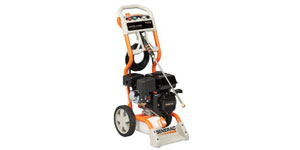 Residential pressure washers fall into one of two basic categories: machines that are cold water only, and machines that have the capacity to heat water to high temperatures as it passes through them. Cold water machines, to be clear, do not only use cold water, but because they do not have independent heating mechanisms, the temperature of the spray is limited to whatever temperature of water you are running through them. While you could conceivably run hot water from a residential tap through them, this is not going to be very efficient. Most household hot water heaters hold between 40 and 60 gallons, and residential pressure washers typically have flow rates of about 1.5 to 2.0 gallons per minute; any big job will exhaust your hot water supply before you are halfway finished.
Residential pressure washers fall into one of two basic categories: machines that are cold water only, and machines that have the capacity to heat water to high temperatures as it passes through them. Cold water machines, to be clear, do not only use cold water, but because they do not have independent heating mechanisms, the temperature of the spray is limited to whatever temperature of water you are running through them. While you could conceivably run hot water from a residential tap through them, this is not going to be very efficient. Most household hot water heaters hold between 40 and 60 gallons, and residential pressure washers typically have flow rates of about 1.5 to 2.0 gallons per minute; any big job will exhaust your hot water supply before you are halfway finished.
Of course, for the majority of residential jobs discussed above, having a hot water pressure washer is not necessary, because the combination of the spray’s high pressure and any detergent or other chemical solvents you may choose to use will usually be more than enough to get dirt and grime removed. But on some jobs you will want to have the hot water option – for example, when you are removing grease or oil from your garage floor or driveway.
Hot water residential pressure washers typically have to use gasoline or propane, as opposed to electricity, as a power source, and this has its limitations. You can of course use gas powered pressure washers anywhere outdoors, but should avoid using them indoors and if you are using them in an enclosed space such as a garage, be sure it is well ventilated; otherwise fumes could become a dangerous problem. Hot water pressure washers are typically much larger and more expensive than the average residential pressure washer, and most homeowners will tend to find that the extra cost is not worth the added benefit of having hot water.
This is largely because most residential pressure washers are equipped to have either a reservoir or intake tube for chemical solvents and detergents, and with these added to the spray, hot water is simply not necessary. Intake tubes work by siphoning whatever chemical agent is to be mixed with the water directly from its own bottle. Reservoirs have to be filled with the chemical agent before pressure washing begins. The second option is a bit more portable than the first, but both are very effective.
1b. Power Source
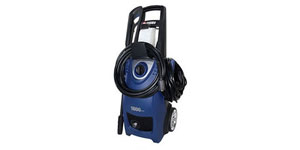 Residential pressure washers will have one of two power sources: they may be gas powered or electric. As mentioned above, gas powered residential pressure washers should never be used indoors, and even if you are using them outdoors you have to take care to ensure you are not breathing in the fumes from their exhaust. Gas powered residential pressure washers do have their advantages, however. These models tend to be able to support higher pressures and produce greater flow rates than their electric counterparts.
Residential pressure washers will have one of two power sources: they may be gas powered or electric. As mentioned above, gas powered residential pressure washers should never be used indoors, and even if you are using them outdoors you have to take care to ensure you are not breathing in the fumes from their exhaust. Gas powered residential pressure washers do have their advantages, however. These models tend to be able to support higher pressures and produce greater flow rates than their electric counterparts.
Gas powered residential power washers typically have flow rates that approach 2.0 gallons per minute and have pressures of up to nearly 2,000 pounds per square inch. Gas powered residential power washers are more mobile than electric ones, which can have its advantages: if you are washing all of your second floor windows, for example, you will not have to worry about trailing an extension cord all the way around your house. At the same time, these units tend to be a bit more expensive than electric residential pressure washers, and while they have higher PSI and flow rates, the extra muscle they provide in these metrics is often not entirely necessary for the vast majority of household related uses for a pressure washer.
Electric residential pressure washers do not produce any fumes and have zero emissions at the point of use, but at the same time they are limited in their range by the fact that they are tethered to a power outlet, and do tend to have lower flow rates and pressures than gas powered residential pressure washers. Electric residential pressure washers generally have flow rates of about 1.2 to 1.7 gallons per minute and have pressures of up to about 1500 pounds per square inch. Electric pressure washers have the advantage that they are always ready to use whenever you need them: you simply plug them in and start the job.
You also do not have to keep smelly gas cans or messy oil cans on hand in your garage or tool shed when you have an electric residential pressure washer, and these machines generally need a lot less complicated maintenance to make sure their engines are running smoothly. Gas powered residential pressure washers have engines that will need occasional maintenance, but this is always the classic tradeoff between gas and electric: power comes at the price of emissions, fuel costs, and maintenance.
1c. PSI & Flow Rate
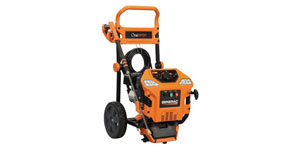 The pressure, measured in pounds per square inch, and flow rate, measured in gallons per minute, are two of the more important determinants of a residential pressure washer’s overall ability. When you multiply pounds per square inch by the gallons per minute, you get a good metric of a pressure washer’s cleaning prowess. Higher PSI means the residential pressure washer can direct a stronger stream at a surface, which can be very useful when you are trying to strip obstinate grime or old paint away. And higher flow rate means the residential pressure washer is putting more water per minute on the surface, which will increase the speed at which you can wash dirt, cobwebs, or mud off of it.
The pressure, measured in pounds per square inch, and flow rate, measured in gallons per minute, are two of the more important determinants of a residential pressure washer’s overall ability. When you multiply pounds per square inch by the gallons per minute, you get a good metric of a pressure washer’s cleaning prowess. Higher PSI means the residential pressure washer can direct a stronger stream at a surface, which can be very useful when you are trying to strip obstinate grime or old paint away. And higher flow rate means the residential pressure washer is putting more water per minute on the surface, which will increase the speed at which you can wash dirt, cobwebs, or mud off of it.
Residential pressure washers typically have pressures of between 1200 and 2000 PSI, with the majority of them falling somewhere around about 1500 PSI. You will have the option to set your residential pressure washer to much lower PSI than the advertised maximum – this just gives you an idea of how high it can go. And in most cases you will not want to be running your residential pressure washer at the highest PSI setting, especially if you are washing windows, double hung screens, or wood surfaces. Very high PSI can damage or even break a lot of surfaces, so it is always best to start low and work your way up. It is also very important to always keep in mind that high pressure water can pose safety risks to the users, and be sure that you are operating your residential pressure washer very carefully.
The flow rate on a residential pressure washer will fall somewhere between 1.5 and 2.5 gallons per minute. For most residential cleaning jobs, the same rules that apply to the washers’ pounds per square inch also apply here: you will have the option to dial down the gallons per minute on your pressure washer to a lower flow than the advertised one, and for the majority of cleaning jobs you do not need to be spraying more than two gallons a minute at a surface. It is also important to make sure you are not using the highest gallon per minute setting on porous organic surfaces such as wood, because they can become waterlogged and take days to fully dry out. It is especially important to keep this in mind if you are washing a deck in preparation for applying paint or sealant to it.
1d. Ease Of Use
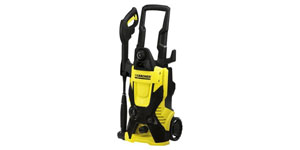 The term “ease of use” describes a concept of the overall washing experience a particular residential pressure washer can provide, and it can be a hard thing to specifically define. There are a number of specific product specs that will combine to affect the overall ease of use on a machine, and it can be difficult and complicated to keep track of all of them. While metrics like pounds per square inch and gallons per minute make it easy to quantify a pressure washer’s total cleaning power and rank one machine against another in a few seconds, there are several features that one has to consider when determining a machine’s overall ease of use.
The term “ease of use” describes a concept of the overall washing experience a particular residential pressure washer can provide, and it can be a hard thing to specifically define. There are a number of specific product specs that will combine to affect the overall ease of use on a machine, and it can be difficult and complicated to keep track of all of them. While metrics like pounds per square inch and gallons per minute make it easy to quantify a pressure washer’s total cleaning power and rank one machine against another in a few seconds, there are several features that one has to consider when determining a machine’s overall ease of use.
The mechanism by which you switch from one pressure to another is a major one. Some residential pressure washers allow you to control the pounds per square inch with the trigger on the machine’s wand, and while these models are more expensive, they are also a lot easier to use than models that require you to switch from one nozzle tip to another to change pressure. At the same time, if you do opt for a model that requires you to switch nozzle tips, make sure you get one with at least five or six options so you have a broad range of pressure settings to choose from. You want to make sure you have enough tips to cover whatever types of different jobs you may be using the washer for.
Maneuverability is another key determinant of a residential pressure washer’s ease of use. You want a machine that is compact but powerful, and it should be light enough that you will be able to easily move it from your garage or tool shed to whatever area of your property you will be using it on. Big, reinforced wheels are a definite plus in this area, and the frame should be lightweight but strong enough to support the various components of the pressure washer. You also want the machine to have a footprint that makes it easy to store in your garage or tool shed.
Residential pressure washers with onboard detergent reservoirs are much easier to use than those with siphon hoses, and if there is more than one reservoir, even better. The length of the hose is also important – I recommend trying to find one that is at least twenty feet long so you can move around without having to take the pressure washer with you.
1e. Price & Value
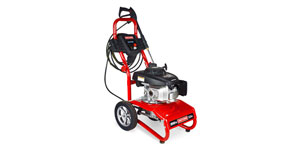 The price and value of a machine are two very different, if completely related, things. The price is simply how much your residential pressure washer costs, while the value describes a host of design and manufacturing aspects that determine the overall quality of the product. Just because a residential power washer is high priced does not mean that it has a lot of value. Because of that, it is important to do some serious comparison shopping within whatever price range you are comfortable with to make sure you are getting the most bang for your buck.
The price and value of a machine are two very different, if completely related, things. The price is simply how much your residential pressure washer costs, while the value describes a host of design and manufacturing aspects that determine the overall quality of the product. Just because a residential power washer is high priced does not mean that it has a lot of value. Because of that, it is important to do some serious comparison shopping within whatever price range you are comfortable with to make sure you are getting the most bang for your buck.
Residential pressure washers fall along a wide range of prices, and for the most part this variation is due to several fairly obvious differences: pressure washers with higher PSI and gallon per minute ratings are usually more expensive than those with lower ones, and gas powered, hot water residential pressure washers are more expensive than electric cold water ones. Within each category, however, there is also substantial variation in pricing, and it can be difficult to figure out whether you should buy a more expensive or less expensive model.
Both options can be tempting: less expensive models can save you money up front, which is attractive, but more expensive models often carry well known brand names and have other aspects that make them equally appealing. This is where it becomes necessary to look beyond simple metrics like PSI and flow rate, and examine the kinds of features that affect the machine’s ease of use. But beyond that, you should also be looking at the manufacturer of the engine to see if they are a trusted name in small engine manufacturing like Briggs & Stratton, Kohler or Honda. It is also important to take a close look at what kinds of materials were used to manufacture the residential pressure washer.
It is always better to find a machine that has been made using welded or stamped metal parts – of the two, welded is superior – rather than composite or plastic parts. Residential pressure washers made with quality parts will be more durable, stand up to wear and tear better and have longer life spans. Plastic pressure washers will be more prone to breaking or getting damaged.
Finally, always keep in mind that just because a product is cheaper, it does not mean that it has less value, and try to shop based on the above criteria rather than ranking products by their price tags alone.
2. Best Residential Pressure Washer Reviews
Simpson MSH3125-S 




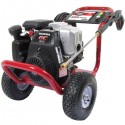
The Simpson MSH3125-S has the kind of powerful engine and sleek design that will make it easy to take care of lots of different tasks with it – so easy, in fact, that you may find yourself wishing there were more chores around the house that you could use it to take care of quickly [...]
AR Blue Clean AR142P 




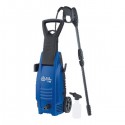
AR Blue Clean AR142P is an electric pressure washer with lots of cleaning power and a number of other excellent advantages. Unlike a gas powered residential pressure washer, the AR Blue Clean AR142P is never going to need an oil change or tune-up, and you will not have to keep smelly gas cans in your [...]
AR Blue Clean AR118 




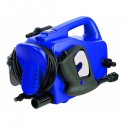
The AR Blue Clean AR118 is designed with convenience and portability in mind. It is very lightweight, at just under twelve pounds, and it is quite compact as well, with a big handle that makes it easy to carry with you as you clean your deck, walls, or other surfaces. But it also has a [...]
AR Blue Clean AR383 




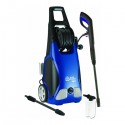
The AR Blue Clean AR383 is easy to use and does such a great job that you will be finding yourself looking for dirt or stains to blast away with it. You no longer have to use elbow grease to take out tough stains and dirt, because the pressure washer does all of the work [...]
Karcher K5.85 M Plus 




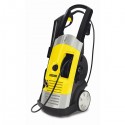
Karcher K5.85M Plus is the kind of superior residential pressure washer that you will certainly want to purchase if you have lots of big cleanup jobs to take care of around the house. As soon as you get it out of the box, it will be pretty obvious that this is a pressure washer that [...]
These are the 10 best residential pressure washers based on product quality, customer satisfaction, and price:

